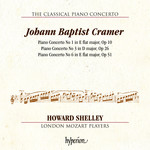
Cramer: Piano Concertos Nos 1, 3 & 6
 $30.00
Out of Stock
$30.00
Out of Stock6+ weeks add to cart
JOHANN BAPTIST CRAMER
Cramer: Piano Concertos Nos 1, 3 & 6
Howard Shelley (piano/conductor), London Mozart Players
[ Hyperion The Classical Piano Concerto Vol 7 / CD ]
Release Date: Friday 2 October 2020
This item is currently out of stock. It may take 6 or more weeks to obtain from when you place your order as this is a specialist product.
Cramer's piano concertos were written to showcase his formidable proficiency in the new pianistic techniques-and evolving piano technologies-of the day. Howard Shelley here revisits the composer, delivering persuasive accounts of three further concertos.
Born in Mannheim, Johann Baptist Cramer (1771-1858) was a child prodigy who grew up in a 'hot-house' environment of musicians which included his father, a celebrated violinist, Wilhelm Cramer. Drawn almost certainly by the lucrative advantages that London could provide, his father moved there during the 1770s to join an already substantial population of immigrant musicians. At this time, London's economic energy began to attract musicians from all over Europe, including such people as Johann Christian Bach and Carl Friedrich Abel, whose pioneering subscription concerts initiated a burgeoning musical culture in Britain's capital. Another immigrant musician, the highly influential Muzio Clementi, who had made Britain his home after 1766, became Cramer's teacher in 1783 and, although Cramer's study with Clementi was short-lived, the influence of the Italian was profound in terms of inculcating a love of Haydn, Johann Christian Bach and Mozart as well as figures such as J S Bach and C P E Bach. Before he was twenty, Cramer made a tour of European musical centres in his capacity as a brilliant pianist-a reputation which established him at the forefront of London keyboard virtuosi when he returned home in 1791. He was also much admired abroad, not least by Beethoven, whom he met in Vienna during a second European tour in 1799. A prolific composer for the piano, he was much admired by Beethoven, Moscheles and Schumann, and his standing as a teacher at the Royal Academy of Music, where he taught from the inception of the institution in 1822, was marked by his Studio per il pianoforte (1804 and 1810), which remained a pedagogical staple for many years.
Cramer's eight concertos for the piano (nine if we include the Concerto da camera of 1813), composed between 1792 and 1825, were written for him to show off his particular skills in modern piano techniques, notably his prowess for intricate figurations, complex embellishment and legato playing. This was common practice during a fertile era of composer-pianists (some others being Field, Kalkbrenner, Hummel, Dussek, Moscheles and Steibelt) who drew large audiences at London's subscription concerts such as those organized by Salomon. Most of Cramer's concertos were first performed at his annual Benefit Concerts which took place in London, though there are numerous instances where his pupils also performed them.
Jeremy Dibble © 2020
" All three works have individuality and substance; and it's hard to imagine they can ever have been much better played. There are just a few moments - for instance the chords of the piano's first entry in Concerto No. 1, which sound over-full (rather than actually overloud) on Shelley's modern concert grand - where you miss the feel and articulation of a classical-period piano. In every other respect the immaculate playing here is alert and personable in a way that transcends contentious issues of style." BBC Music
'Irresistibly cheerful, with enough in the way of invention and scintillating technical challenge to hold the attention throughout. And there can be no finer guide to this near-forgotten music than Howard Shelley who, yet again, sounds as if he's been relishing these works for years. The LMP have clearly caught his infectious enthusiasm, too, and Hyperion's sound is gloriously present and lifelike' (Gramophone)
Tracks:
Piano Concerto No 1 in E flat major Op 10 [28'51]
1 Allegro [15'52]
2 Andante [5'09]
3 Rondo: Allegretto [7'50]
Piano Concerto No 3 in D major Op 26 [24'05]
4 Allegro spiritoso [10'06]
5 Pastoral e sostenuto: Larghetto [6'54]
6 Rondo: Scherzando - Allegro [7'05]
Piano Concerto No 6 in E flat major Op 51 [25'18]
7 Allegro spiritoso [13'43]
8 Larghetto affettuoso [4'35]
9 Rondo: Allegretto [7'00]